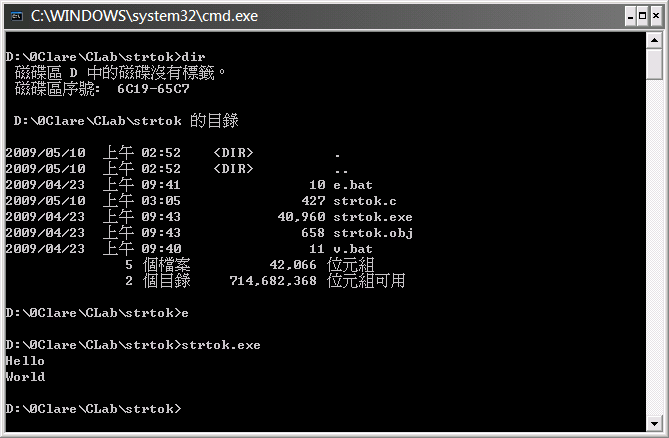(筆記) 如何使用strtok()? (C/C++) (C)
Abstract
strtok()的簡單使用範例。
Introduction
使用環境 : Visual Studio 2008
strtok.c / C
1 /*
2 (C) OOMusou 2009 http://oomusou.cnblogs.com
3
4 Filename : strtok.c
5 Compiler : Visual C++ 9.0
6 Description : Demo how to use strtok() in C
7 Release : 05/09/2009 1.0
8 */
9 #include <stdio.h>
10 #include <string.h>
11
12 int main() {
13 char str[] = "Hello,World";
14 const char *del = ",";
15 char *s = strtok(str, del);
16
17 while(s != NULL) {
18 printf("%s\n", s);
19 s = strtok(NULL, del);
20 }
21
22 return 0;
23 }
2 (C) OOMusou 2009 http://oomusou.cnblogs.com
3
4 Filename : strtok.c
5 Compiler : Visual C++ 9.0
6 Description : Demo how to use strtok() in C
7 Release : 05/09/2009 1.0
8 */
9 #include <stdio.h>
10 #include <string.h>
11
12 int main() {
13 char str[] = "Hello,World";
14 const char *del = ",";
15 char *s = strtok(str, del);
16
17 while(s != NULL) {
18 printf("%s\n", s);
19 s = strtok(NULL, del);
20 }
21
22 return 0;
23 }
執行結果

完整程式碼下載
strtok.7z
Remark
csie-tw問到,為什麼第二次呼叫時,要使用strtok(NULL, del),這是一個很好的問題,所謂『有code有真相』,來看看Microsoft怎麼實作strtok()。
https://research.microsoft.com/en-us/um/redmond/projects/invisible/src/crt/strtok.c.htm
1 /* Copyright (c) Microsoft Corporation. All rights reserved. */
2
3 #include <string.h>
4
5 /* ISO/IEC 9899 7.11.5.8 strtok. DEPRECATED.
6 * Split string into tokens, and return one at a time while retaining state
7 * internally.
8 *
9 * WARNING: Only one set of state is held and this means that the
10 * WARNING: function is not thread-safe nor safe for multiple uses within
11 * WARNING: one thread.
12 *
13 * NOTE: No library may call this function.
14 */
15
16 char * __cdecl strtok(char *s1, const char *delimit)
17 {
18 static char *lastToken = NULL; /* UNSAFE SHARED STATE! */
19 char *tmp;
20
21 /* Skip leading delimiters if new string. */
22 if ( s1 == NULL ) {
23 s1 = lastToken;
24 if (s1 == NULL) /* End of story? */
25 return NULL;
26 } else {
27 s1 += strspn(s1, delimit);
28 }
29
30 /* Find end of segment */
31 tmp = strpbrk(s1, delimit);
32 if (tmp) {
33 /* Found another delimiter, split string and save state. */
34 *tmp = '\0';
35 lastToken = tmp + 1;
36 } else {
37 /* Last segment, remember that. */
38 lastToken = NULL;
39 }
40
41 return s1;
42 }
2
3 #include <string.h>
4
5 /* ISO/IEC 9899 7.11.5.8 strtok. DEPRECATED.
6 * Split string into tokens, and return one at a time while retaining state
7 * internally.
8 *
9 * WARNING: Only one set of state is held and this means that the
10 * WARNING: function is not thread-safe nor safe for multiple uses within
11 * WARNING: one thread.
12 *
13 * NOTE: No library may call this function.
14 */
15
16 char * __cdecl strtok(char *s1, const char *delimit)
17 {
18 static char *lastToken = NULL; /* UNSAFE SHARED STATE! */
19 char *tmp;
20
21 /* Skip leading delimiters if new string. */
22 if ( s1 == NULL ) {
23 s1 = lastToken;
24 if (s1 == NULL) /* End of story? */
25 return NULL;
26 } else {
27 s1 += strspn(s1, delimit);
28 }
29
30 /* Find end of segment */
31 tmp = strpbrk(s1, delimit);
32 if (tmp) {
33 /* Found another delimiter, split string and save state. */
34 *tmp = '\0';
35 lastToken = tmp + 1;
36 } else {
37 /* Last segment, remember that. */
38 lastToken = NULL;
39 }
40
41 return s1;
42 }
可以發現,當S1為NULL時,他會使用lastToken這個static char *這個pointer+1繼續搜尋,若S1 != NULL,則當成第一次使用strtok()。



